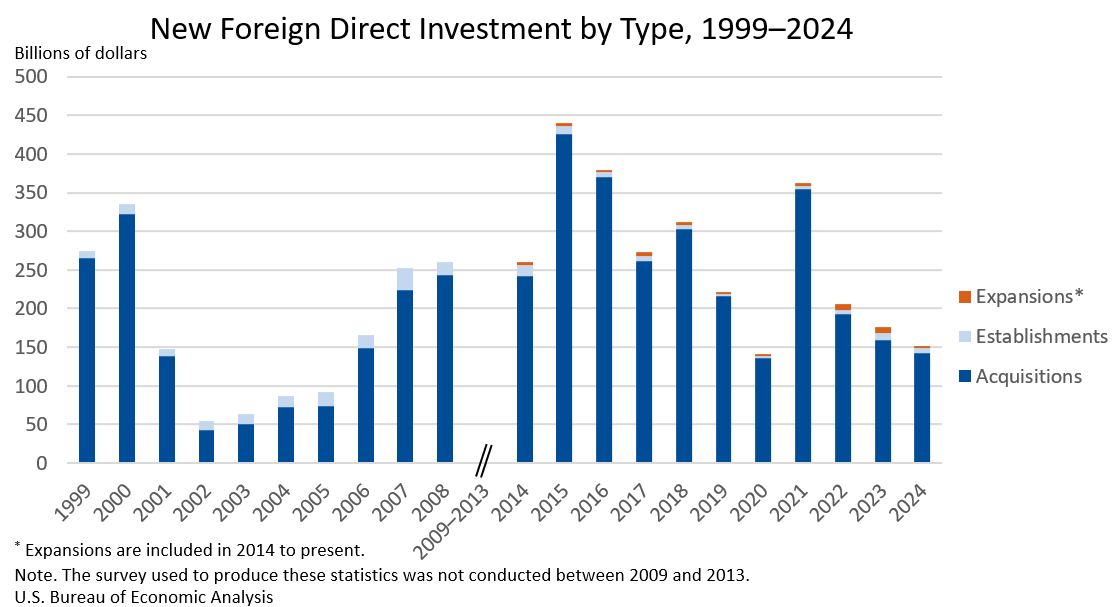Bureau of Economic Analysis
New Foreign Direct Investment in the United States, 2024
Expenditures by foreign direct investors to acquire, establish, or expand U.S. businesses totaled $151.0 billion in 2024, according to preliminary statistics released today by the U.S. Bureau of Economic Analysis. Expenditures decreased $24.9 billion, or 14.2 percent, from $176.0 billion (revised) in 2023 and were below the annual average of $277.2 billion for 2014–2023. As in previous years, acquisitions of existing U.S. businesses accounted for most of the expenditures.
Principal Federal Economic Indicators
Noteworthy
- 2025 News Release Schedule
- Innovation at BEA
- 2025 Annual Updates
- New! Services Trade Data for More Countries
- Data Tool: Trade in Value Added
- Distribution of State Personal Income
- Updated: RIMS II Regional Multipliers
- Arts and Culture
- Space Economy
- FDI Now in State BEARFACTS
- Quick Guide: Price Indexes
The Latest
Quarterly Gross Domestic Product by State, 2005–2013 (Prototype Statistics)
The quarterly GDP by state prototype statistics for 2005-2013 provide a more complete picture of economic growth across states as they evolve from quarter to quarter. The quarterly GDP by state statistics are released for 21 industry sectors and are released in both current dollars and inflation-adjusted chained (2009) dollars. Nondurable-goods manufacturing was the largest contributor to U.S. real GDP by state growth in the…
Quarterly Gross Domestic Product by State, 2005-2013 (prototype statistic)
Today, the U.S. Bureau of Economic Analysis released prototype statistics of quarterly gross domestic product (GDP) by state for 2005–2013. These new statistics provide a more complete picture of economic growth across states that can be used with other regional data to gain a better understanding of regional economies as they evolve from quarter to quarter.
U.S. Virgin Islands' Economy Shrinks for Third Consecutive Year
The estimates of Gross Domestic Product for the U.S. Virgin Islands show that real GDP, adjusted to remove price changes, decreased 5.4 percent in 2013. This was the third consecutive decline following decreases of 13.8 percent in 2012 and 7.5 percent in 2011.
Gross Domestic Product for U.S. Virgin Islands (USVI), 2013
This release is available as a PDF download.
Coming Soon: More Timely Data on the Health of States' Economies
BEA’s annual gross domestic product by state report provides a crucial look into the health of states’ economies. Soon businesses, consumers, and policymakers will get a sneak peak at a more timely and frequent version of the report.
Personal Consumption Expenditures by State Prototype Estimates for 1997-2012
Prototype estimates of personal consumption expenditures (PCE) for states for 1997-2012 provide a new tool for state-level analysis of consumer activity and household economic well-being. The PCE-by-state estimates are released for 16 expenditure categories that correspond to the national level expenditure categories published by BEA.
Personal Consumption Expenditures by State, 1997-2012 (prototype statistic)
Today, the U.S. Bureau of Economic Analysis released prototype estimates of personal consumption expenditures (PCE) for states for 1997-2012. These new estimates provide insight into household spending patterns across states that can be used together with other regional data to gain a better understanding of regional economies.
June 2014 Trade Gap is $41.5 Billion
The U.S. monthly international trade deficit decreased in June 2014 according to the U.S. Bureau of Economic Analysis and the U.S. Census Bureau. The deficit decreased from $44.7 billion in May (revised) to $41.5 billion in June as exports increased and imports decreased. The previously published May deficit was $44.4 billion. The goods deficit decreased $3.0 billion from May to $60.3 billion in June; the services surplus increased $0.1…
BEA's New Statistical Product Enriches Understanding of Consumer Behavior at the State Level
On August 7th, the Commerce Department’s Bureau of Economic Analysis (BEA) will premiere a new report on consumer spending, “Personal Consumption Expenditures by State.” This represents a major advancement in the level of information available on consumer spending behaviors at the sub-national level. Why is it important? Because consumer spending is a major driver of the U.S. economy’s overall health.
U.S. International Trade in Goods and Services, June 2014
NOTE: See the navigation bar at the right side of the news release text for a link to an important note about recent changes to goods and services that were implemented in June as part of BEA's comprehensive restructuring of the International Economic Accounts. Also see links to data tables, contact personnel and their telephone numbers, and supplementary materials.
-->




